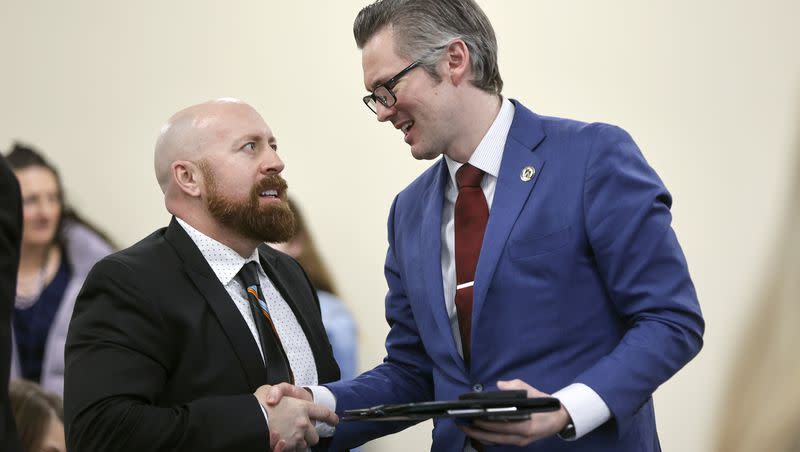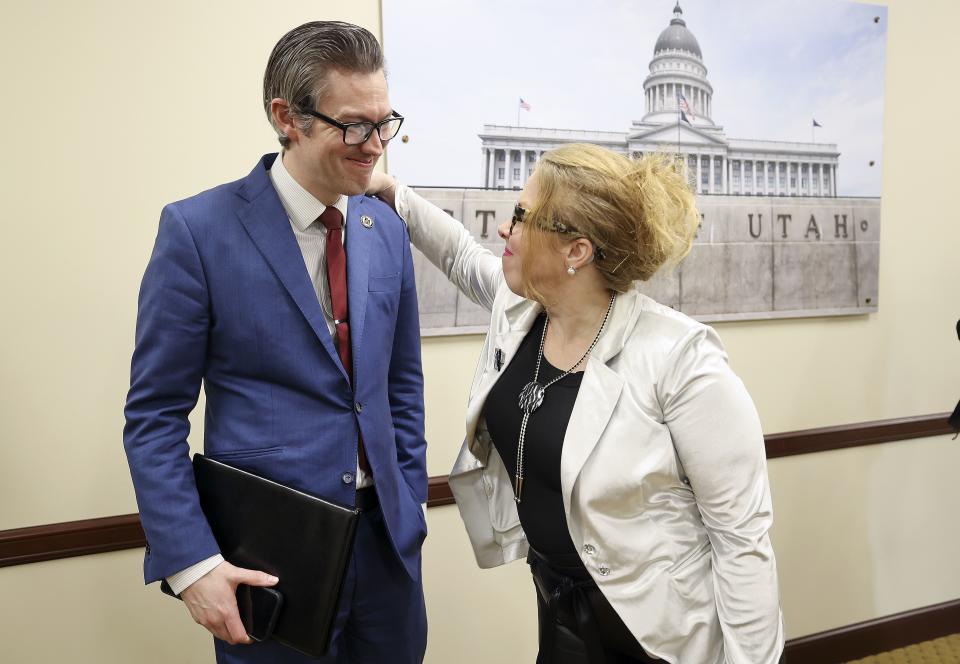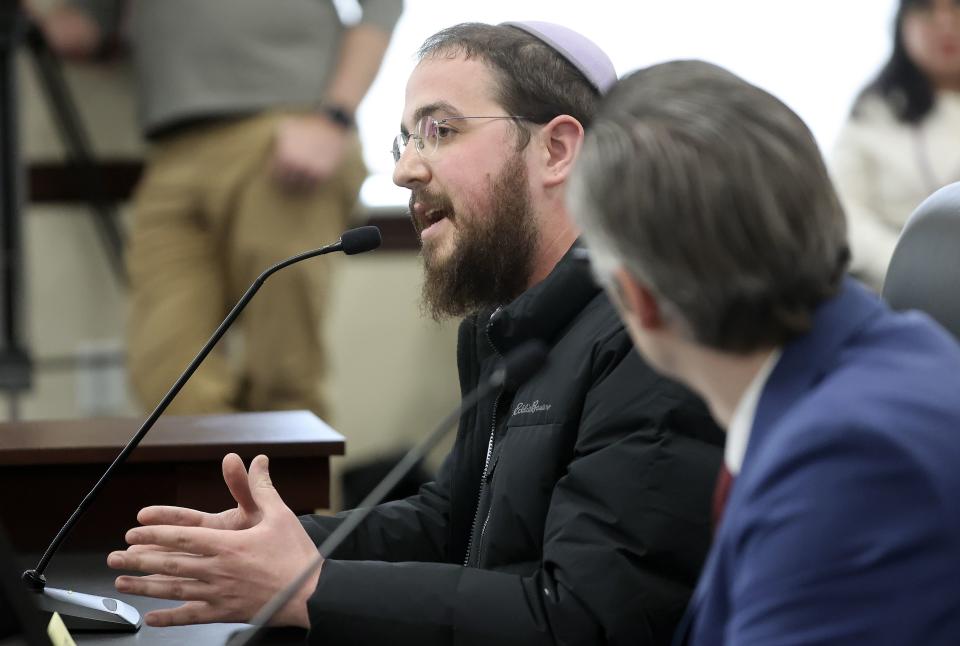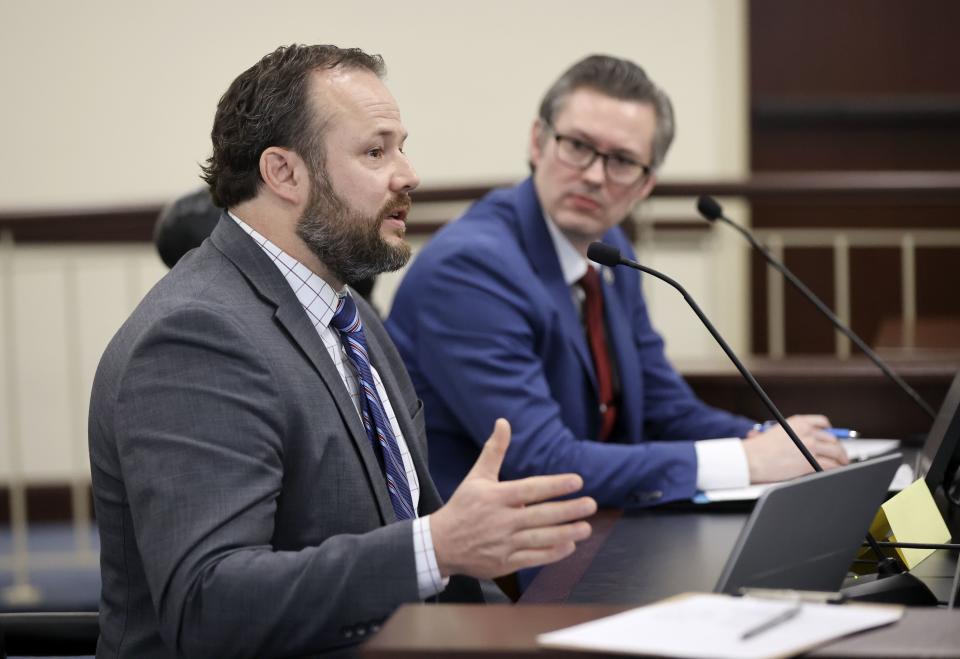Utah House Judiciary Committee approves bill that would allow clergy to report child abuse

The Utah House Judiciary Committee voted unanimously Friday for a bill that would shield clergy from criminal and civil liability if they report ongoing child abuse and neglect discovered during religious confessions.
“Without this protection, this clear path for clergy, there will be abused children who are not going to receive justice,” said Will Carlson, chief policy adviser for the Salt Lake County District Attorney’s Office.
The only opposition to HB432 during a public hearing Friday came from two defense attorneys who suggested possible improvements that the bill’s sponsor, Rep. Anthony Loubet, R-Kearns, said he would consider.
Utah law requires clergy and all other adults to report child abuse and neglect to child welfare services or police. But similar to clergy-penitent laws in most U.S. states, Utah’s law also exempts clergy from reporting information about abuse obtained through private confessions.
Related

Many faiths maintain the confidentiality of those confessions based on canon law, church doctrine or practice, Loubet said, and Utah’s exemption “acknowledges the significance of religious freedom and the confidentiality that exists within sacred spaces.”
The proposed bill, which now goes to the House floor, makes it clear that Utah law allows clergy to report private communications without penalty.
“It is in large part educational,” said Rep. Brian King, D-Salt Lake City. “It tells the public and it tells members of the clergy, ‘When you receive information from a perpetrator and you believe that their actions are leading to ongoing abuse or neglect, you may report it.’ You don’t have to report it. But you may report it. This moves us forward appropriately and properly in the direction of putting to an end continuing abuse of children.”
Loubet’s bill would provide additional protections for clergy who do report abuse obtained through confessions. He characterized those protections as new incentives to report.
“If a member of the clergy adheres to the reporting requirements which outline this bill, they will be granted civil and criminal liability protections,” Loubet said. “This safeguard aims to encourage reporting, while acknowledging the potential conflicts that may arise within religious institutions.”
Faith leaders in Utah have not opposed the bill, in large part because it does not require clergy to report.
“There are hundreds and hundreds of my brothers and sisters of the cloth across the state that support this bill,” said Rabbi Avremi Zippel, program director at Chabad Lubavitch of Utah and chair of the Utah Crime Victims Council.

He said most people struggle when confronted by the possibility that someone they know and maybe like or revere has committed abuse. HB432 gives clergy the ability to turn that information over to objective fact-finders to make a determination, he said.
“To kick those situations to an objective outsider is a gift that so many of our clergy across the state approve of,” Rabbi Zippel said.
Spokespersons for The Church of Jesus Christ of Latter-day Saints and the Catholic Diocese of Salt Lake City have said they don’t oppose the bill as currently written.
Catholic canon law forbids a confessor to betray a confession in any manner, and the diocese has maintained a close watch on HB432.
“We remain concerned about the possibility that the language could be changed to require that Catholic priests report such abuse even if they have learned about the abuse solely during the Sacrament of Confession,” the diocese said in a statement. “If this requirement were to become law, Catholic priests would face the untenable choice of breaking the law or being excommunicated.”
Loubet said clergy would be exempt from being forced to testify in court, because the priest-penitent privilege belongs to the confessor. But allowing clergy to report in cases with exigent circumstances would allow law enforcement to begin investigations independent of the clergy’s report.
Latter-day Saint policy directs leaders who learn about abuse from a confession to first assess if victims or potential victims are safe, and then urge the confessor to report their crime to law enforcement. It also directs leaders to call a help line which assists in informing leaders about their own legal reporting obligations.
Regarding the safety of individuals, the church’s handbook states: “... the duty to protect others is more important than the duty of confidentiality. Leaders should contact civil authorities immediately.”
Eight of the 10 people who spoke during the hearing supported the bill, though some wanted it to go farther.
“While this bill is not perfect, it takes a solid step in the right direction by explicitly protecting the clergy-penitent privilege under the Utah rules of evidence,” said Goud Maragani, chair of the Utah Gay Straight Coalition. “We are hopeful that this law will increase the number of clergy members who voluntarily report child abuse they learn about through confessions from perpetrators. If this works, we will be able to stop the abuse of more children in Utah. This is a noble, noble goal and one that I think we can all agree on.”
Three women spoke during the hearing about being abused or seeing abuse as children. A woman from Bluffdale who joined the hearing via Zoom said she was abused for two years as a teenager by someone she loved who had responsibility for her safety and well-being. He confessed to a religious leader she called a good man unequipped to help the abuser or stop the abuse.
“It was in my best interest to have my abuse reported,” she said. “I’m now in my 50s and my abuse has impacted almost every aspect of my life for decades. I’m asking that you support this bill to help protect those children who are currently being abused and will be in the future.”
Rep. Tyler Clancy, R-Provo, called the bill important for children.
“Children cannot advocate for themselves. They need systems in place to help them,” he said. To Loubet, he said, “I respect the work you’ve done on this and you know if it’s one inch in the right direction, I’m 100% behind it.”
Two defense attorneys asked Loubet to amend the bill to take into consideration the needs of those who confess abuse to ecclesiastical leaders.
“If they go to their best friend, if they go to their wife, if they go to a doctor, if they go to a therapist or a psychiatrist, all of those people are mandatory reporters,” Mark Moffat said. “The one place that they can go and that they have traditionally gone is they’ve gone to their ecclesiastical leaders to attempt to get some help, to attempt to start the process of reconciliation, to start the process of forgiveness.”
Moffat expressed concern the bill won’t protect ecclesiastical leaders from lawsuits for reporting a confession and raises other questions.
“How do they report?” he said. “What did they report? Do they report the confessor’s name? Do they report the victim’s name? What constitutes a good faith belief the abuse is ongoing?”

Steve Burton, director of the Utah Defense Attorney Association, echoed Moffat’s concerns and said that as written, the bill doesn’t take into account a victim who might not want the abuse reported to law enforcement.
He suggested the bill’s language could be changed to say clergy are allowed report abuse only if they believe it will continue if not reported and if they believe it is in the best interest of the victim.
“There were a couple of suggestions made to make the bill more tailored towards the child,” Loubet said. “I’m going to think about them and see if maybe they might be able to help make the bill better.”
Loubet said he will start talking to other House members to address possible concerns before a vote that could send the bill to the Senate.

